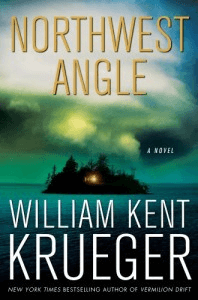Book Review: Northwest Angle By William Kent Krueger
New York: Atria Books, 2011. $24.99
Welcome back to northern Minnesota and the quickest, most exciting read closest to the Canadian border. The Northwest Angle is a place of majestic vistas, pristine forests, and ocean-like waters in the Lake of the Woods. And William Kent Krueger’s love for this sparsely inhabited region generates all possibilities concerning its independent populace of peace seekers and rogues.
In Northwest Angle, Cork O’Connor and family are vacationing on a houseboat when their lives are threatened by a derecho—a monster storm with hurricane-force winds. The storm sets the mood of violence amid spectacular beauty in this twelfth installment of the spirited series. While the family seeks shelter on one of a myriad of islands, Cork’s oldest daughter Jenny finds the tortured corpse of a young Native American woman and her hidden and healthy infant son, giving rise to another of the novel’s themes: children and family.
With his children entering adulthood and his wife deceased—due to an airplane crash two years prior—Cork is dreading the loneliness of an empty home. Yet his children’s choices are awakening new possibilities: Jenny asserts her motherhood as she defends the newfound child from kidnappers; and Stephen, fifteen, wholeheartedly embraces his father’s Ojibwe heritage, learning of the responsibilities and consequences of becoming a Mide (a healer). As the story progresses, we meet another family, the founders of the Church of the Seven Trumpets, who seek seclusion and security for their worshippers and carry rifles when meeting with outsiders. Heavy lies the burden upon the adults guiding their charges.
The novel’s setting in the Angle Islands engenders a sense of the primitive beauty and natural turmoil that have molded the region’s modest citizenry. In this land of contrasts, all things are possible and best expressed by Amos Powassin, a blind Ojibwe elder: “In all good is the possibility of evil, and in all evil the possibility of good.” Further, the Ojibwe culture emanates from every thread of the story, endowing the thriller with greater meaning. William Kent Krueger allows readers to smell the campfire bacon of deception, but doesn’t let us fully digest the meal until the powerful conclusion.
—Patricia Cook
